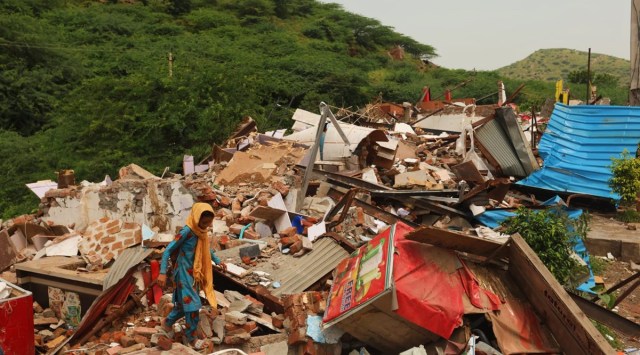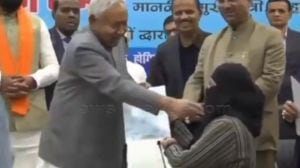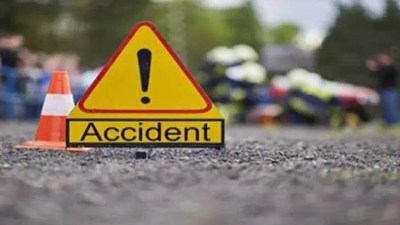No pick-and-choose policy behind Nuh demolitions: Haryana
The district administration has said that a total of 354 people were affected by the recent demolition drive in Haryana's Nuh, of which 283 were Muslims and 71 were Hindus.
 Questioning the demolition drive, the high court earlier this week asked if the properties of a “particular community” had been targeted “under the guise of a law and order problem” and if an “exercise of ethnic cleansing” was being conducted. (File)
Questioning the demolition drive, the high court earlier this week asked if the properties of a “particular community” had been targeted “under the guise of a law and order problem” and if an “exercise of ethnic cleansing” was being conducted. (File) DENYING ANY “pick-and-choose policy” and maintaining that due procedure was followed, the district administration has said that a total of 354 people were affected by the recent demolition drive in Haryana’s Nuh, of which 283 were Muslims and 71 were Hindus.
Seeking to put the numbers in perspective, it has cited the 2011 Census data to point out that Muslims account for over 79 per cent of the total population in Nuh.
On August 7, the Punjab and Haryana High Court had raised questions on the demolition drive, asking whether properties of a “particular community” were targeted “under the guise of a law and order problem”, and an “exercise of ethnic cleansing” was being conducted. It had asked the state government to file an affidavit on how many buildings had been demolished, and if any notice was issued before demolition.
“The total structures demolished were 443 of which 162 were permanent and 281 were temporary. Similarly, the number of persons affected from the demolition drive were 354, of which 71 were Hindus and 283 were Muslims,” the Nuh Deputy Commissioner, Dhirendra Khadgata, has said in a 400-page affidavit.
While Additional Advocate General of Haryana, Deepak Sabherwal, sought to submit the affidavit on Friday, the Division Bench of Chief Justice Ravi Shanker Jha and Justice Arun Palli directed him to file it in the court registry. The affidavit is set to be filed on Saturday.
Citing the 2011 Census, the affidavit said the district’s total population was 10,89,263, of which 79.20 per cent were Muslims and 20.37 per cent were Hindus. “The Census of 2011 clearly shows that Nuh is a Muslim-dominated district. Further, the projected population of Nuh in 2023 is 14,21,933. It is pertinent to mention that in Punhana tehsil of Nuh district, Muslims make up 87 per cent of the population and 85 per cent in Ferozepur Jhirka,” the affidavit said.
It said that due procedure of law was followed before the demolitions. “The government, while removing encroachments/ unauthorised constructions, never adopted pick-and-choose policy and that too on caste, creed or religion,” it said.
“The apex court and the high court have time and again directed the state governments and local authorities to demolish/ remove unauthorised encroachments by way of permanent /temporary constructions on government/ panchayat/ local bodies’ lands. The demolitions in question were routine measures taken by independent local authorities against the owners/ occupiers or illegal structures and that too after following the due procedure of law,” it said.
In a similar reply, Nishant Kumar Yadav, the Deputy Commissioner of Gurgaon, which also saw a demolition drive, has submitted that action was taken to remove unauthorised structures in compliance with the court’s directions.
“Due procedure of law has been followed before demolition of these constructions. No demolition was carried out without following the procedure of law. It is also pertinent to mention that the government while removing encroachments/ unauthorised constructions never adopted pick-and-chose policy and that too on the basis of caste, creed or religion,” the Gurgaon district administration has said.
“The state government while collecting such information on encroachment does not collect any information with regard to caste, creed and religion, and all the encroachers are dealt with in the same manner,” it has said.
Speaking to reporters outside the court, Additional Advocate General of Haryana, Deepak Sabherwal, said all the structures that were demolished in Gurgaon belonged to Hindus.
The demolition drive in Nuh began on August 3, days after the district saw communal violence during a yatra organised by the VHP and Bajrang Dal on July 31. Six persons, including two home guards, were killed in the clashes. Many of those affected by the demolition drive had alleged that they did not receive prior notice.







